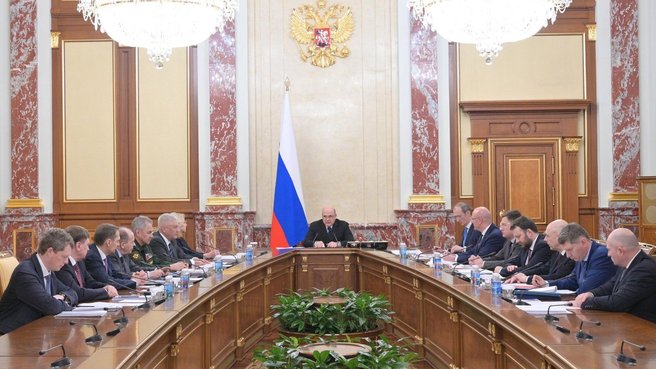Mikhail Mishustin: “I ask you to intensify the process of upgrading existing combat systems as much as possible. This much-needed work allows our defence industrial complex to improve the effectiveness of vehicles and equipment on the battlefield and, as a result, save many lives, both in the military and those of civilians they protect.”
Mikhail Mishustin’s opening remarks:
Good afternoon, colleagues.
Today’s meeting of the Coordination Council is taking place in run-up to Defender of the Fatherland Day, which we have marked for over 100 years. I would like to warm-heartedly congratulate all of our defenders on the upcoming holiday. You too, colleagues. All the best.
Today Russia once again has to confront unfriendly actions. And we must, of course, provide our military on the frontline with comprehensive support, from weapons, to social assistance, and on to advanced means of rehabilitation.
This year, in addition to the increased volume of production, we also have to increase the supplies of almost all material and technical resources.
At the same time, it is necessary to continue to improve the test pieces used in the special military operation zone. We are talking about dozens of projects. New items have now begun to reach the troops.
This much-needed work allows our defence industrial complex to improve the effectiveness of vehicles and equipment on the battlefield and, as a result, save many lives, both in the military and those of civilians they protect. Therefore, I ask you to intensify the process of upgrading existing combat systems as much as possible, including by expanding their functionality.
An equally important area is the organisation of peace-time life and construction. In the autumn of 2022, the Donetsk and Lugansk people’s republics, Zaporozhye and Kherson regions became part of Russia. The President instructed us to integrate them into Russia’s common socioeconomic space and bring them to the national level in all respects.
We have launched a comprehensive development programme for these regions, which includes the economy, infrastructure, healthcare, education, culture, and sports.
A specialised state programme has also been approved.
Over this period, more than 18,000 facilities were restored there, including 6,500 residential buildings and social institutions, as well as more than 2,000 km of roads.
Fortifications were erected and strengthened, both along the line of military contact of troops and along the border territories. This work continues.
I would also like to discuss material and social support for our service personnel. A presidential executive order has established the Defenders of the Fatherland State Fund. The range of its projects has expanded considerably in early February, including efforts to monitor the complete provision of high-quality support for veterans and families of personnel involved in the special military operation.
We will now allocate an 18 billion-plus rouble grant to help our service personnel and their families address various situations in life. First of all, this implies the purchase of medical items and technical rehabilitation systems for those discharged from military service, as well as restoring documents, training and retraining programmes, as well as job placement. The President recently discussed these issues at a meeting with our service personnel.
I am asking the Ministry of Labour to oversee a targeted and cost-effective disbursement of funding. Support for defenders is our common objective, and we must address it in a highly responsible manner.
Several other decisions deal with members of volunteer units. The Government has modified regulations for calculating and paying monthly benefits to the families of those now defending the country’s interests. Those giving birth to children and raising them will receive these benefits.
Now, when calculating the average per capita income to determine the right to a single benefit, one-time payments made to compensate for damage caused to life and health in connection with participation in a special military operation will not be taken into account.
We have also signed a resolution noting that National Guard of Russia volunteers are eligible for standard war veteran certificates, as well as privileges and benefits stipulated by the law. This includes property tax, 50-percent compensation for utility payments and free commuter train tickets. In addition, they are entitled to monthly cash payments.
The President has instructed us to analyse the regulatory framework and law enforcement practice, as regards all measures for assisting personnel involved in the special military operation and providing them with documents once again. We should also submit proposals on expediting and streamlining the relevant procedures. It is important to provide equal social guarantees and insurance payments to volunteers working in the Donetsk and Lugansk people’s republics, and the Zaporozhye and Kherson regions. We need to discuss this issue and, if necessary, draft proposals on common approaches towards providing similar forms of support to members of volunteer units.
Of course, we must complete this work as soon as possible.
Colleagues,
Today, we will review the results of implementing earlier decisions, and we will specify areas where we should exert additional efforts for accomplishing presidential objectives.
I would like to ask the heads of working groups to report on the current situation.









